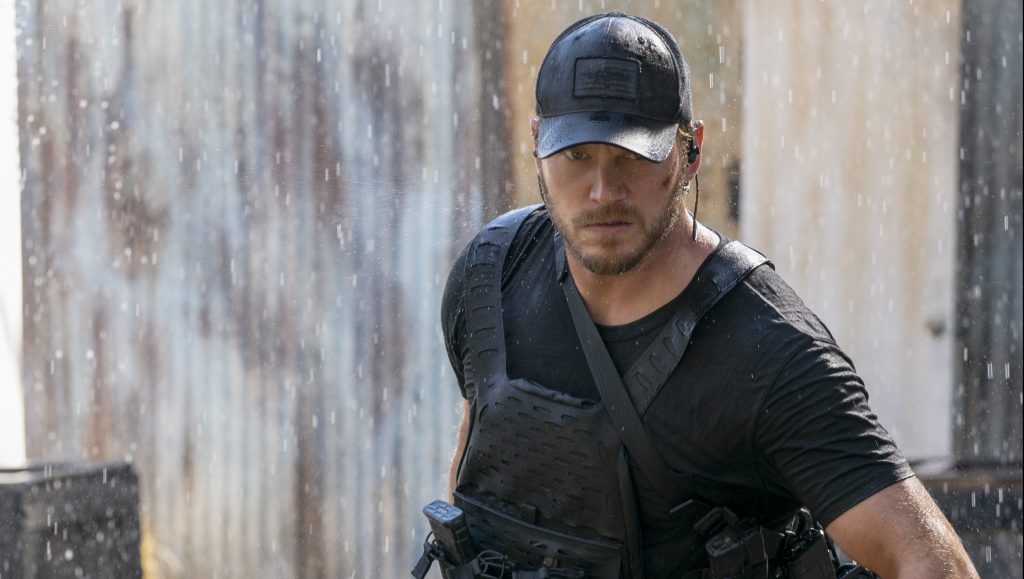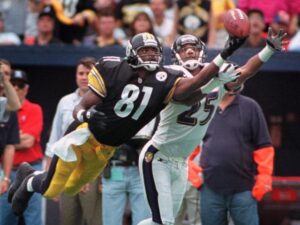In his new Amazon series “The Terminal List,” actor Chris Pratt is built like a brick wall, and has about half as much charisma. His character, James Reece, is on a Charles Bronson-esque mission of revenge against the forces that ambushed his Navy SEAL platoon in the field and, back home, irrevocably altered his family life (with his wife played, mainly in flashback, by a wildly overqualified Riley Keough, and his daughter by Arlo Mertz). Dead-eyed and flat-mouthed, Reece guts adversaries with an axe and orders them to walk, watching as they stumble; or axes them in the head; or handcuffs their families and strands them in a rising tide, or…
This is a dour, miserable sit, one that would be tough to take as a two-hour film, and has been inexplicably ‘roided up to eight hours. (Perhaps on film, one or two kills might have had to be excised — and this project clearly measures its success on body count.) Adapted from a Jack Carr novel, “The Terminal List” is executive produced by Pratt himself, among others, and it’s a striking sort of vanity project. Running through his character’s titular list and taking out the names on it, Pratt is freed from the burden imposed upon him elsewhere to be charming and witty and light amid chaos. Noticeably brawnier and with his voice pitched down, Pratt’s only responsibility is to mete out justice to those who took first his men and then his women; indeed, he declares “I am justice” right before knifing one in his endless parade of enemies.
To a certain strain of viewer, he’ll certainly look the part: Pratt, who played a SEAL in “Zero Dark Thirty,” a former Green Beret in “The Tomorrow War,” and a Navy veteran in the “Jurassic World” franchise, has put in the work in his career to be seen as the face of American might. Here, that power is best put to use taking out enemies both within and without: Defense contractors come in for punishment, as do (sigh) Mexican sicarios. Reece’s story is baleful, and it’s made clear to us that he’s fighting the establishment as much as he’s fighting for revenge, but if this series were an op to desensitize us against military violence, it couldn’t have been made more effectively.
It would not be outrageous, given that the conspiracy against Reece is drawn from many powerful corners, to expect some commentary or critique in the mix, as can be read into an entertainment as mainstream as Clint Eastwood’s “American Sniper” — a movie which is at once about the achievements of a military superstar and the ways his time at war brought him pain. But “The Terminal List” is too occluded by self-conscious darkness to allow much of a way in. Seen through Reece’s eyes, the world is divided between those one protects and those one kills, with an unyielding absence of middle ground. His blankness is the point: He can’t allow personality, spark, insight — the things that make us human — to compromise his mission.
All of which sucks the rest of the project into a Pratt-sized vacuum. Constance Wu, playing the journalist trying to reveal what happened to Reece’s team and his family, isn’t where she belongs, and worse, she seems aware of it: So winning elsewhere, she’s trudging through scenes. (What a shame that when Wu and Jeanne Tripplehorn — two performers of intuitive warmth and snappy cleverness — share scenes together, it’s within the clumsily written context of a reporter reading the Secretary of Defense the riot act.) And Taylor Kitsch, playing Reece’s best friend, is badly underused, if only because his sad eyes communicate the real cost of war. Pratt attempts, infrequently, to communicate trauma and weariness — in one ill-advised shot, emerging from a reverie and attempting to reset his face, as if to communicate how a man of war returns to the battlefield — but it doesn’t work. We don’t believe the character needs to take time or effort to return to killing, because for the rest of the time, Pratt is so visibly enjoying playing He-Man.
Instead of Kitsch, then, we get kitsch — a sentimentalized view of wartime and the way it purifies the mind and cleans the slate. Perhaps the most revealing sequence in “The Terminal List” is one in which chaotic violence breaks out in the streets of San Francisco, the consequence for many civilians of being caught between men who want to play at war. (This sequence seems to play out like a fantasy of violent strife on American soil, a way of bringing war home that, coming as it does between endless other bits of ultraviolence, bears no real weight.) At the end of this sequence, Pratt looms over his antagonist of the episode, shot from below as to visually dominate him. And he unceremoniously shoots him in the head. Why make it fancy? When you’re certain of your righteousness, any show of force will do.
“The Terminal List” debuts on Prime Video on Friday, July 1.



